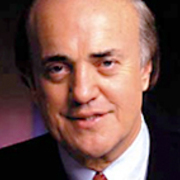
Peter Arnett
Of the many New Zealand journalists who have reported around the globe, Peter Arnett arguably became one of the most visible on the international stage.
Arnett grew up in Bluff, "at the bottom end of the world" one of three brothers. All three would go on to write for The Southland Times in Invercargill, before heading much further afield. Peter went to Indonesia and Laos, then made his name during a decade plus in Vietnam, reporting for news agency Associated Press.
Arnett was in Laos reporting on their Civil War for the Associated Press, when Captain Le Kong seized control of the small South-East Asian Country for a second time on 10 August 1960. Facing challenging communications to the outside world and closed roads out of the country, Arnett swam across the river with his story, passport and $200 in his teeth to reach Thailand. He sent the story by telegraph, and the next day it appeared in papers around the world.
This was only the start of a career in which he would become a premiere war correspondent. His peers lauded his work. “The best reporter of the [Vietnam] war” claimed New York Times journalist and Pulitzer Prize winner David Halberstam. “Maybe the quintessential war correspondent of our half-century” extolled the paper’s editor, Bill Keller. Perhaps the biggest indicator of his journalistic doggedness was his relationship with those in power. In 1965 an aide of American President Lyndon Johnson described him as "more damaging to the US cause than a whole battalion of Vietcong". The following year Arnett took away his own Pulitzer Prize, one of 60 journalism prizes won over a long career.
In 1980, many foreign assignments later, Arnett wrote Canadian television series Vietnam — The Ten Thousand Day War, which summarised 30 years of conflict over 13 hours. In 1983 he produced and presented documentary Poisoning for Profit, which won a Cable ACE award for best Public Affairs or Magazine Show. By now Arnett was starting to think television might be the best place for him. "I felt I wasn't getting through to people," he later told The Listener. "Newspapers are being read less in the US, and maybe television could give a more potent message. I thought 'Here I am risking my life — I may as well risk it to get a great impact.' "
So he joined Ted Turner's fledgling cable news channel CNN. In 1991, Arnett's 57-day coverage of the Gulf War made him a household name. Initially he was part of a trio of CNN journalists providing 16 hours of continuous live coverage as bombs first began falling on Baghdad. After others departed the city, Arnett was the sole western reporter remaining.
Arnett's coverage earned both controversy and awards. Some Americans, including a number of politicians, called him the "traitor of Baghdad". Arnett argued that CNN's coverage was criticised because "we were giving a view not subject to US censorship. We were able to show pictures of civilian areas we had damaged, people wounded and killed in the bombing by multinational forces."
Regardless of how well it was received, nobody could accuse his war coverage of ever not being comprehensive, as evidenced by the public profile of some of his interviewees. Among them — Fidel Castro, General Manuel Noriega, Saddam Hussein (for whom he was asked to wash his hands) and Osama Bin Laden. Arnett's encounter with Bin Laden was later dramatised for Kiwi TV movie A War Story (John Leigh played Arnett).
In 1994 Arnett published book Live from the Battlefield: From Vietnam to Baghdad, 35 Years in the World's War Zones. In a positive review, The LA Times asserted that "Arnett's book is, above all, a sharp reminder that the technology of journalism may change, but the qualities that make for good journalism do not. What really counts ... are hustle, savvy, imagination, ingenuity and sheer physical courage, all of which Arnett possesses in abundance."
Arnett left CNN in 1999, a year after fronting a controversial CNN/Time magazine report which claimed the American army had used chemical weapons on US deserters in Laos during the Vietnam War. At the time New York Times editor Gene Roberts argued that in fronting a story in which he was not the main reporter, Arnett was simply following common practice. "The question is whether an industry practice should be an industry practice."
In 2003 Arnett became part of the headlines again while working for NBC, after commenting in an interview with an Iraqi TV station that that American war effort had failed. Stirring outrage in the American press, where he was labelled “anti-American”, he was fired from NBC. After taking up positions with The Daily Mirror and TV stations in both Belgium and Greece, he retired from journalism in 2007.
In 2012 Arnett was awarded a New Zealand Order of Merit in the yearly Queen's Birthday Honours. He was made a professor of journalism at China’s Shantou University in 2007, where he taught until retiring in 2015. He now resides in Fountain Valley, Los Angeles.
Profile written by Ian Pryor; updated on 26 August 2019
Sources include
Ben Stanley 'How New Zealand's Peter Arnett, the world's greatest war correspondent, found peace at last' - 1972 magazine. Summer issue, 2015
Bruce Ansley 'Peter Arnett - Truth is Not Treachery' - The Listener, 15 April 1991, page 14
Christopher Callahan, 'Arnett's Role' - American Journalism Review, September 1998
Jonathan Kirsch, 'A Savvy Reporter's Controversial and Gritty Tour of Duty : LIVE FROM THE BATTLEFIELD, From Vietnam to Baghdad: 35 Years in the World's War Zones, by Peter Arnett' - The LA Times, 2 February 1994
'Live from the Battlefield' (Video interview) C-Span website. Loaded February 1994. Accessed 26 August 2019